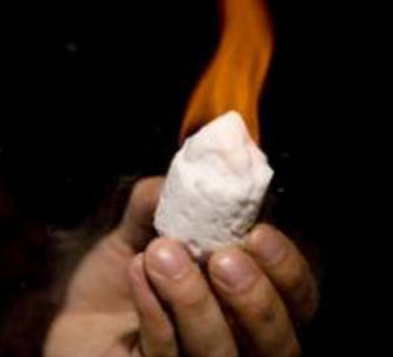
Department of EnergyMethane hydrate, being held by a magician, I assume.
Energy companies got all excited last month when the Department of Energy started handing out investments to explore gas hydrates on the ocean floor off the East Coast. These hydrates are basically methane gas trapped in little pockets of ice (basically), so of course energy companies want to bring them up, thaw them out, and set them on fire.
There’s just one little problem: The extremely warm water off the coast may already be melting the hydrates.
From NBC News:
Temperature changes in the Gulf Stream are “rapidly destabilizing methane hydrate along a broad swathe of the North American margin,” the experts said in a study published Wednesday in the peer-reviewed journal Nature.
Using seismic records and ocean models, the team estimated that 2.5 gigatonnes of frozen methane hydrate are being destabilized and could separate into methane gas and water.
It is not clear if that is happening yet, but that methane gas would have the potential to rise up through the ocean and into the atmosphere, where it would add to the greenhouse gases warming Earth. …
“It is unlikely that the western North Atlantic margin is the only area experiencing changing ocean currents,” they noted. “Our estimate … may therefore represent only a fraction of the methane hydrate currently destabilizing globally.”
Over at the Smithsonian’s blog, it is noted that this is likely part of a long-term warming trend.
The thaw was “probably caused solely by warming of the ocean over the past few thousands years,” Juergen Mienert writes in Nature. Long-term shifts in the temperature or location of the Gulf Stream have been going on for around 5,000 years, the study suggests, and these changes are destabilizing 2.5 gigatonnes of methane hydrate.
On the one hand, that this isn’t linked to short-term climate change is reassuring. But on the other hand, it’s a bit disconcerting, kind of like saying: No, the stream of gasoline flowing under that burning car is from a nearby fuel depot, not the car’s gas tank, so there’s n*KABOOM*



